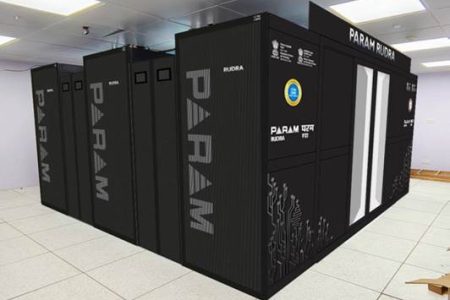Bhubaneswar: In a significant boost to India’s scientific research capabilities, Prime Minister Narendra Modi inaugurated the PARAM Rudra supercomputer at the S.N. Bose National Centre for Basic Sciences (SNBNCBS) in Kolkata today. The state-of-the-art high-performance computing system, developed under the National Supercomputing Mission (NSM), will cater to the needs of 10-12 institutions and thousands of researchers across the Eastern Region, driving advancements in fields ranging from advanced materials to astrophysics.
The PARAM Rudra, part of the series of supercomputers installed across India under the aegis of the Ministry of Electronics and Information Technology (MeitY) and the Department of Science and Technology (DST), represents a major leap forward for research in areas like high-energy physics, earth sciences, and cosmology. Prime Minister Modi lauded the development as a critical step in boosting India’s technological prowess, not just in scientific research but also in sectors such as disaster management and economic growth.
Located at the S.N. Bose Centre, an autonomous institute under DST, the supercomputer will provide high-performance computing resources to key institutes in the region, including the Bose Institute, Saha Institute of Nuclear Physics (SINP), Indian Institute of Chemical Biology (IICB), and the Indian Institute of Science Education and Research (IISER) Kolkata. These facilities will allow scientists to perform complex simulations and calculations at unprecedented speeds, drastically reducing the time required to solve intricate problems in multiple scientific domains.
The 838 TFLOPS NSM facility is expected to revolutionize research in materials science by enabling high-throughput computational materials design, speeding up the discovery of new materials. In earth sciences, it will aid in computational modeling of planetary materials and integrate advanced experimental methods. Additionally, the supercomputer will support machine learning research in biological sciences, helping researchers explore biomolecular functions and aiding in the development of treatments for diseases.
The PARAM Rudra supercomputer will also be pivotal in high-energy astrophysics research, offering insights into the fundamental properties of matter and the universe. It will assist scientists in studying the non-equilibrium properties of strongly interacting matter, including dense matter explored in the ALICE experiment at CERN.
Beyond scientific research, PARAM Rudra is poised to benefit numerous other sectors. It will enhance India’s global competitiveness in space exploration, semiconductor manufacturing, and industry 4.0 technologies. Prime Minister Modi highlighted the system’s potential to improve disaster management, economic growth, and the ease of doing business, marking its impact on the everyday lives of citizens.
The supercomputer’s capabilities will also significantly enhance India’s ability to predict weather and climate-related phenomena, bolstering the nation’s resilience against natural disasters and other environmental challenges.
The inauguration of the PARAM Rudra at S.N. Bose National Centre underscores India’s commitment to self-reliance in high-performance computing. By investing in such cutting-edge technologies, the country is ensuring that its scientific community remains at the forefront of global research and innovation.

